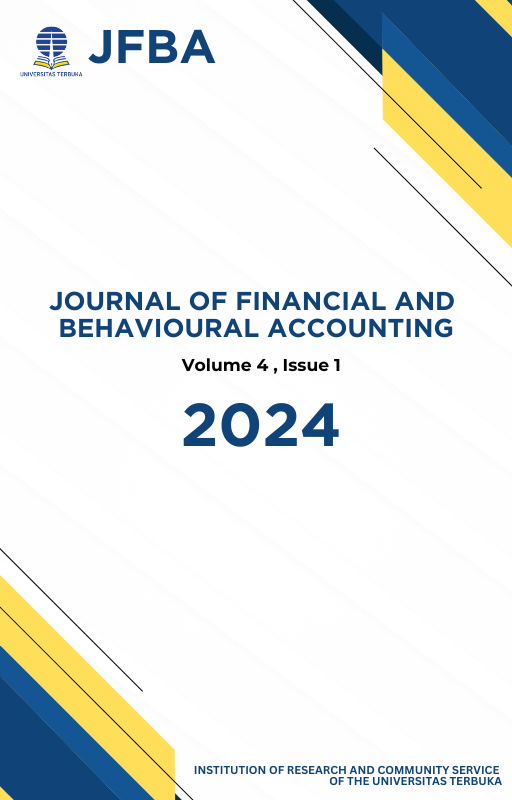Profession as Accounting for Non-Accounting Graduates
DOI:
https://doi.org/10.33830/jfba.v4i1.7842.2024Keywords:
Accountant Profession , Non-Accounting Graduate, QualitativeAbstract
The challenges of finding work are getting harder every day, and accounting graduates face intriguing issues as a result of the intense competition for available positions and remarkable problems. From the perspective of non-accounting graduates, this study provides a deeper analysis of the phenomenon that takes place in the accounting industry. Numerous industries that use non-accounting graduates as accountants frequently experience this situation. Eleven non-accounting graduates from various firms will be interviewed as part of a qualitative approach to address this situation. This study reveals that their lack of prior accounting knowledge stems from their varied educational backgrounds, such as; their motivation to stay in their current position comes from both internal and external sources; their lack of prior computer knowledge and proficiency is a barrier; and, finally, their adaptation process is facilitated by co-workers and independent self-education through educational materials or courses. It is hoped that as this research advances, both qualitative and quantitative methods will be used to help understand this phenomenon comprehensively.
References
Andon, P., Chong, K. M., & Roebuck, P. (2010). Personality preferences of accounting and non- accounting graduates seeking to enter the accounting profession. Critical Perspectives on Accounting. https://doi.org/10.1016/j.cpa.2010.01.001
Blanchard, P. N., & Thacker, J. W. (2023). Effective training: Systems, strategies, and practices. SAGE Publications.
Bowles, M., Ghosh, S., & Thomas, L. (2020). Future-proofing accounting professionals: Ensuring graduate employability and future readiness. Journal of Teaching and Learning for Graduate Employability. https://doi.org/10.21153/JTLGE2020VOL11NO1ART886
Carnegie, G., Parker, L., & Tsahuridu, E. (2021). It’s 2020: What is Accounting Today? Australian Accounting Review. https://doi.org/10.1111/auar.12325
Greenberg, J., & Baron, R. A. (2003). Behavior in Organization International Edition. New Jersey: Prentice Hall.
Kavanagh, M. H., & Drennan, L. (2008). What skills and attributes does an accounting graduate need? Evidence from student perceptions and employer expectations. Accounting and Finance. https://doi.org/10.1111/j.1467-629X.2007.00245.x
Kavanagh, M., Hancock, P., Howieson, B., Kent, J., & Tempone, I. (2009). Stakeholders’ perspectives of the skills and attributes for accounting graduates. Proceedings of the 2009 AFAANZ Conference, 1–29.
Legault, L. (2020). Intrinsic and extrinsic motivation. Encyclopedia of Personality and Individual Differences, 2416–2419.
Richardson, A. J. (2017). Professionalization and the Accounting Profession. The Routledge Companion to Critical Accounting.
Rosa Chaar Hakim, R. (2016). Are Accounting Graduates Prepared For Their Careers? A Comparison of Employees’ and Employers’ Perceptions. In Global Review of Accounting and Finance.
Ryan, R. M., & Deci, E. L. (2000). Intrinsic and extrinsic motivations: Classic definitions and new directions. Contemporary Educational Psychology, 25(1), 54–67.
Vidwans, M., & Du Plessis, R. A. (2020). Crafting careers in accounting: redefining gendered selves. Pacific Accounting Review. https://doi.org/10.1108/PAR-03-2019-0027
Downloads
Published
How to Cite
Issue
Section
License
Copyright (c) 2024 Hempry Putuhena, Elna M Pattinaja, M Rifhki Fauzan S, Trisye N Kilay

This work is licensed under a Creative Commons Attribution-ShareAlike 4.0 International License.







